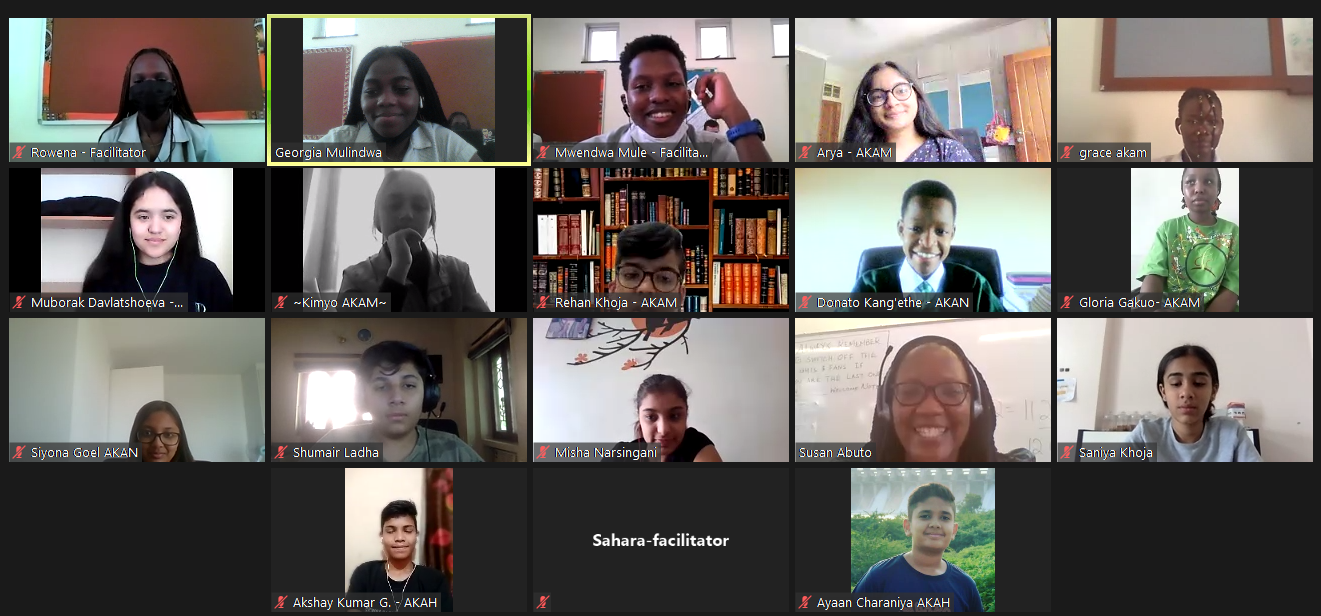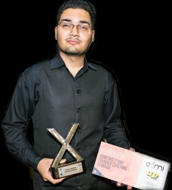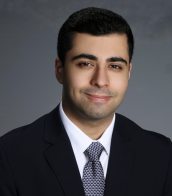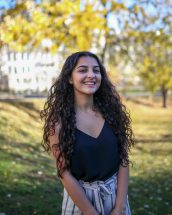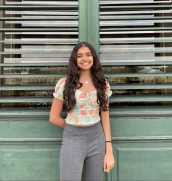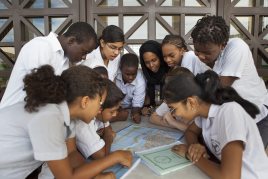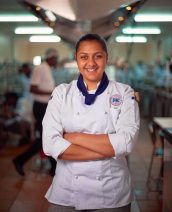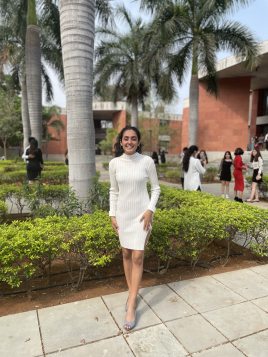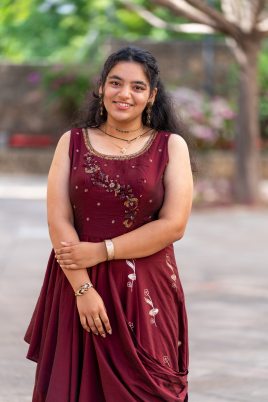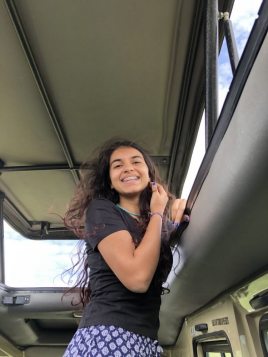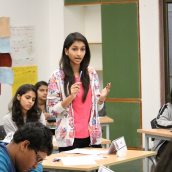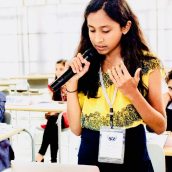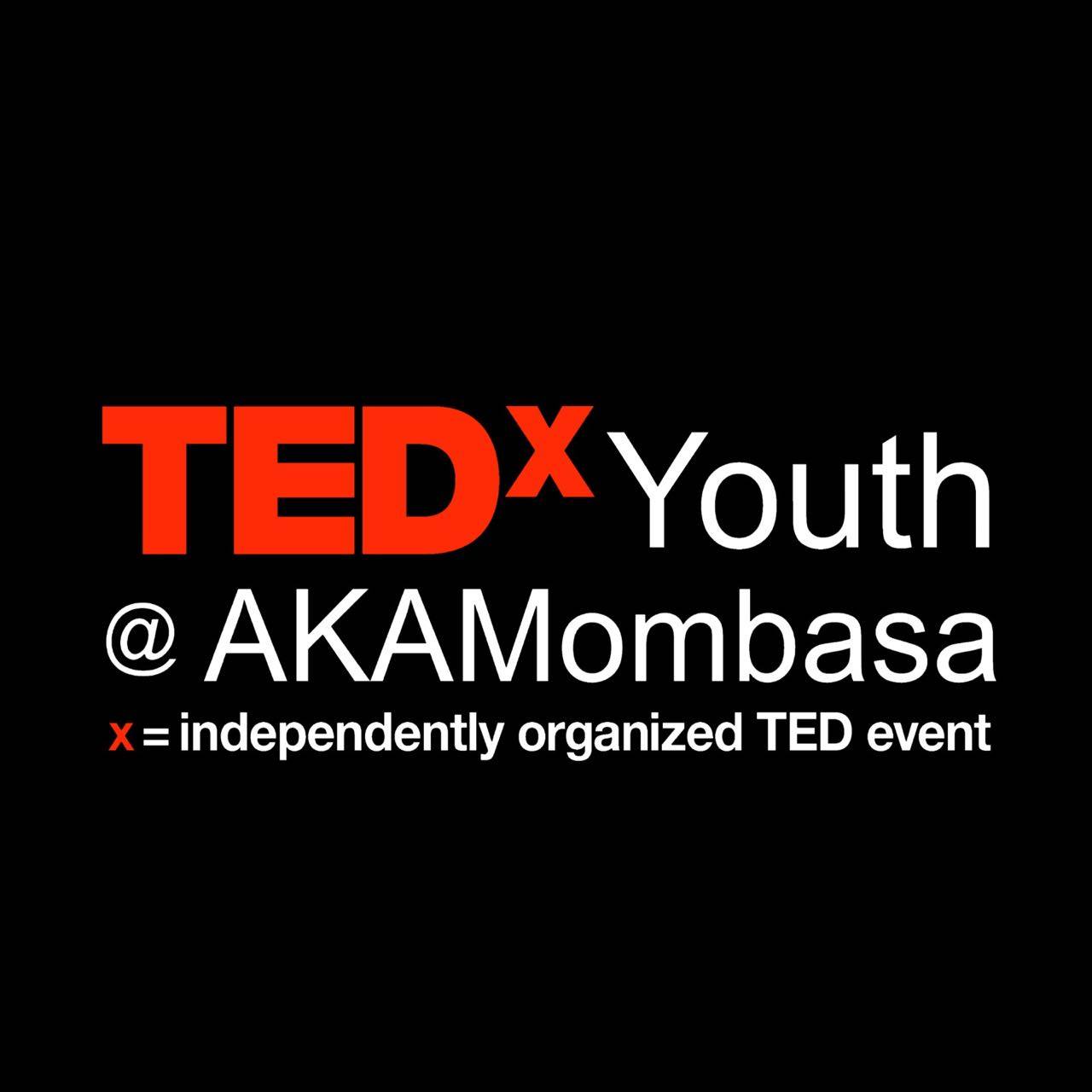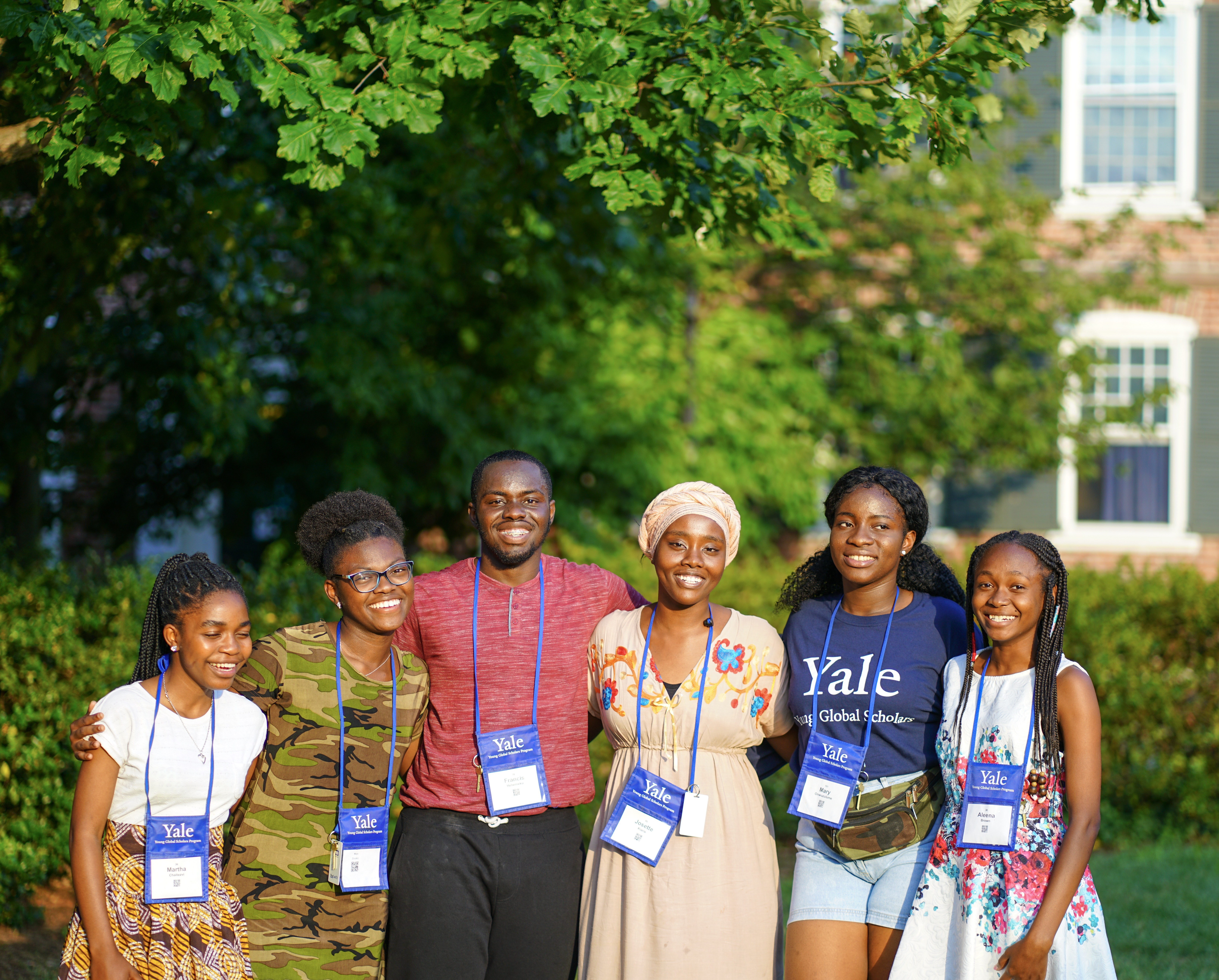At the Aga Khan Academy Mombasa, Ham Serunjogi – CEO and co-founder of African fintech giant Chipper Cash – realised the importance of staying connected to something larger than himself. The Forbes 30 Under 30 honouree is now serving as an advisor to the US President on African diaspora engagement.
Kashyap Gohel (Class of 2011): Providing solutions to improve the world
Kashyap Gohel has been pursuing a Bachelor of Architecture programme at the Jomo Kenyatta University of Agriculture and Technology (JKUAT) in Nairobi, Kenya since graduating from the Aga Khan Academy Mombasa in 2011. "My top marks at the Aga Khan Academy earned me a government scholarship which is about 85% of the annual fees for my architecture course of six years," says Kashyap very proudly. He expects to graduate from JKUAT in June 2017.
"I think the main values the Academy instilled in me were positive attitude, time management, assertiveness, competitive spirit and self-confidence. These are values that I apply on a day-to-day basis to form the foundation of a successful career in art, product design and architecture," Kashyap says confidently. He also adds that the confidence that his skill set gives him takes him further than most in trying challenging and new projects in his field. With this experience in mind he says, "I am sure I shall be quite a pioneer in creating world-changing ideas."
Kashyap believes the coursework at his university and his time management are going smoothly due to the intense training at the Aga Khan Academy. "Coming from the Academy, I believe it set me a level ahead of others, enabling me to go further than my fellow students." He also values the International Baccalaureate curriculum. "It is the only system that I know of that makes it possible for one to develop holistically. One does not just learn academics, but also extracurricular activities, leadership skills, developing talents and solving community problems," he says emphatically.
Since graduating from the Aga Khan Academy, Kashyap has participated in many major events and activities that have brought him recognition and accolades. He was a winner of the Perstorp Open Innovation Challenge 2016 in Sweden which involved submitting ideas on making, repairing and remolding furniture into new shapes and designs rather than disposing of used or broken pieces in landfills. Kashyap has also won the Disruption by Design Award for architectural design in 2015. Other accomplishments include being awarded a tender to create a 14-foot-tall carving at Jomo Kenyatta International Airport in Nairobi, Kenya in 2014 and winning the first round of the Thought for Food Challenge 2013 – an annual competition that challenges university students to develop an innovative solution to improve food security. He also won an international graphic design contest for an Irish boat-making company and has displayed his artwork at Diani Beach Art gallery, Tazama Art Gallery and Kenya Art Fair.
Kashyap was also nominated and sponsored to attend the One Young World conferences in Pittsburgh, USA in 2012, and in Johannesburg, South Africa in 2013. These summits gather the brightest young leaders from around the world, empowering them to make lasting connections and develop solutions to some of the world's most pressing issues.
Kashyap is particularly proud of his first community service project, called Project Desert Farms. He designed this as an architectural solution to help communities on the coast to filter ocean water, obtain housing and food, and reduce deforestation. This project was selected as a finalist project from a worldwide participation of 140 teams, and the only one in Africa that made it to the Thought for Food Global Summit in Berlin, Germany.
While at the Aga Khan Academy Mombasa and after graduating in 2011, Kashyap has been actively involved in many projects and volunteer activities and has also worked for the Academy and other companies in his field. In 2011 he worked with planning and construction management at the Aga Khan Academy. He also volunteered there as a theatre teacher for years 7–10 in 2012 and was involved in the design of two of the Academy’s residential blocks.
Kashyap's most unforgettable experience at the Academy was being a dorm captain in the residential programme. "One of the things I miss about the Academy is the organisation…[and the] efficient order in the way it operates," he comments. Another thing he misses about the Academy is the facilities. "It’s only after leaving the Academy that you appreciate the constant high speed Wi-Fi, adequate number of desks and chairs for students, high-class sports facilities and equipment, and most of all the great ocean climate and friendly people. As they say, nothing beats home," Kashyap reminisces nostalgically.
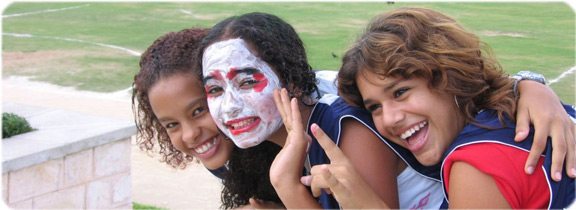
AKA Alumni - Welcome to our Potential Mentors
The Aga Khan Academies is looking to enhance its offerings to its graduates, in an effort to improve communication and aid these individuals as they launch into the working world. As a result, The Aga Khan Academies invites you to be part of the inaugural career mentorship initiative. It is through this one-on-one mentorship programme that we hope to connect AKA mentees (graduates) with professional mentors (alumni/other professionals). We would like for students to be able to do the following with a mentor:
- Discuss potential career choices/moves.
- Get experience that complements and gives them context to their academic pursuits.
- Practice industry-specific, transferable & self-management skills.
- Guidance to improve chances of landing jobs.
- Increase self-awareness and understanding of how to contribute to the work world.
- Expand career options by learning job search strategies.
- Exchange knowledge, insights, and experience with a mentor.
The career mentorship program would run a year in cycle, with an opportunity to renew your capacity as a mentor, if you so desire. In order to make the appropriate career matches, and understand your availability and commitment, we have a few questions to help us with the pairing process.
We ask that you kindly fill out the information request in this form (click here) Rest assured that your personal information will remain confidential and will be for the Academy’s purposes only.
We are looking forward to hearing from you!
AKA Alumni Office
Onwards and Upwards
Congratulations to the Class of 2022! We are so proud of you and cannot wait to see what you do next. As we welcome our new graduating class to our alumni community, we asked four distinct graduates from the Aga Khan Academies in Mombasa and Hyderabad about their journeys and aspirations.
Imra Dawoodani, AKA Hyderabad
Plans to join the University of California, Berkeley for a BSc in electrical engineering and computer science.
What drives you? What is your superpower?
The impact of experiences. Experiences have moulded the most intricate details of the world as I see it. Whether new, old, unexpected, or a planned experience, each circumstance prompts the creation of a new approach within me, defining my ability to adapt to a multitude of situations. Sometimes it outlines my path, in other cases it intrigues me to look for one.
How did the Academy impact you?
It's been a journey. Exposing me to every emotion one could feel, pushing me forward every second because life never stops, and opening routes to a variety of opportunities, the Academy has thoroughly done its part in making me realise that I'm the only one who can take a call for myself.
You’re a new addition to the crayon box; what color would you be and why?
Grey may not seem like the ideal choice, but it depicts my conflicted self. I'm the one trying to figure out light and darkness, ebbs and flows, the balance between emotions and practicality. A simpler derivative to this conclusion would be my utterly annoying indecisiveness. I'd be the one to mix sushi and dal however horrendous it sounds because I just cannot choose what I want to eat today.
Jacintha Thota, AKA Hyderabad
Plans to join the London School of Economics and Political Science for a BSc in politics and economics
What drives you?
Two things that have driven me for a very long time are fascination and long-term goals. I am someone who just loves the idea of learning new things. Whatever I put my mind to is always driven by a sense of love, a sense of wonder, whether that's my academics or my extra curriculars. That fascination keeps me going. When it comes to long-term goals, I do know I want to work in the field of economics when it comes to equity or sustainability and that has shaped my interests and path.
How did the Academy impact you?
The most profound impact has been that it has shown me the world is so much bigger than the bubble that you grew up in. It brought together people from different cultures and socioeconomic backgrounds. It has shaped my goals to be community oriented. And it has shown me that being a good person is having the right mindset and being tolerant to new ideas and new people.
What challenges did you face and how did you overcome them?
COVID-19 lockdowns and the kind of terror it put around the world when I was doing my DP journey meant it was incredibly hard to stay motivated when people were literally dying around you by the thousands. It left me with a sense of cynicism and feeling really demotivated. But actually, coming back to the academy and being around people again reminded me just how much I valued this community. It definitely helped overcome the sense of dread I had started to feel during those 18 months or so.
Khushi Bajaria, AKA Mombasa
Plans to join the University of Miami to study health science (pre-med
What challenges did you face and how did you overcome them? What was your best mistake?
I faced the challenge of making friends because of the way I felt the need to please my friends continuously. However, as I focused time on my goals, I eventually became part of a diverse group of friend groups. I also first thought it was a mistake that I ignored the warning from my personal project coordinator to not go ahead with my idea as it may impact my grades if I fail in it, however, as I believed in the impact it could make and communicated with the right people, I was able to be successful in it and make a greater impact than expected.
How would you describe success and what do you hope to achieve in the next 5 years?
Success is a never-ending mountain with large rocks of joy and glee that help one stay stable, and numerous smaller rocks that keep pushing one to slip backward in their journey of meeting their expectations. The soil of the mountain is then like family and friends that support and help piece part of this journey together to make success what it is. I hope to have completed my bachelor's degree in health sciences and my first year of medical school. I also hope to have expanded my project (teaching Grade 5 to 7 students in how to create and help an eco-friendly microscope). I hope by then, I shall have taught the developmental process in more than fifteen schools in different countries through a team internationally.
Mishal Lalani, AKA Mombasa
Plans to join Middlebury College to major in microbiology and biochemistry and a minor in geography and sociology
What are your plans after graduation?
Firstly, I plan to sleep, have fun and just wind down all the stress that we have been put through for the past two years. I also look forward to and plan to spend time with my family before I leave for university in August, as well as the friends who live around me. Similarly, I hope to do a short internship at the Aga Khan Hospital in Mombasa just to grasp the healthcare environment as that is what I hope to pursue in the future.
What drives you? What is your superpower?
What has particularly always driven me is the community around me. Seeing the community improve when I help out or different community projects help out makes me want to go the extra mile and do more.
How did the Academy impact you?
The Academy made me an all-rounded individual and made me a global citizen. Being the first cohort to go on the exchange programme, I felt very privileged to be at the Academy and to have access to such amazing opportunities that will indeed be spoken about and recognised for the rest of my life. I made the most special memories at the Academy. Most importantly, the Academy taught me that no matter who I am or where I come from, I can make a change if I want to. This was the biggest lesson for me, and I believe it will take me far in life.
Naheed Hirji Keynote Speech at 2016 Peace Summit
Naheed Hirji, Growth and Partnerships Manager at Facebook, Africa was one of the Keynote speakers at the Peace Summit 2016. Naheed has in the past worked with Microsoft, Zynga and various social enterprises that are using technology to make a positive change in the world. He currently works on growing internet penetration in Eastern and Southern Africa using Facebook’s free basics (Internet.org).
Naheed stirred an interesting discussion around the theme of using Internet as a tool for peace. He started off with a conversation around the question “Is internet a human right?” Students responded with some interesting claims including the fact that humans have lived without the Internet before so why can’t they now? However, some brought up the issue of censorship and how governments monitor the public, compromising privacy. A discussion on whether or not internet is a tool for peace followed. Opinion was split in the room at first. The proposers argued how awareness and fundraising for important causes can be done using social media while the opposing side argued that the internet has given birth to cyber bullying.
This discussion finally led up to Naheed sharing how he came to a conclusion about this and why he took the job at Facebook. Naheed was a technology geek growing up but wanted to make a difference using technology. When he was offered the job at Facebook, he was uncertain about the impact he would be able to make, so he used IKIGAI. IKIGAI is a Japanese concept meaning "a reason for being". Everyone, according to the Japanese, has an IKIGAI. Finding it requires a deep and often lengthy search of self. IKIGAI evaluation consists of 4 questions: Are you doing something that you love? Are you doing work or deeds that the world needs or will be better for? What is it that you are really good at? And finally, is it possible to monetize this? His job was going to be to grow internet users in Africa, but how would this benefit people and the world? He thought to himself, the internet is a breeding ground for cyber bullying, spreads false information and hate speech and reduces individual privacy. He used the examples of ISIS and the conflict between Apple and the US government. However, the internet has the incredible power to connect people around the world, enable friends and families to communicate, improve job creation, education and health care levels, gives us information on our fingertips and gives everyone a voice and the power to share their opinion. If he were to help launch free basics, it would make the internet accessible to more people by providing them access to a range of free basic services like news, maternal health, travel, local jobs, sports, communication, and local government information, assisting them to improve their lives. He was going to be able to use technology to make a difference in the lives of billions of people. When he took the job at Facebook, he was sure he had found his IKIGAI.
He believes the internet and technology can be used as a tool for peace. All that is required is a change of attitude, being informed and critical thinking. “We must strive to become responsible citizens of the internet, break cultural, societal and political barriers and engage in respectful dialogue.” he said. He ended by sharing the idea behind peace.facebook.com, which demonstrates friendship and understanding in the most unexpected places and which is what we must aim to achieve using the internet.
By Inaara Gangji, DP1 (The Reporters)
Syeda Sayema Mayesha – tackling global issues through film
Watch Sayema's film "One Sky, Two Souls" below.
Sayema, currently in grade 11, directed and produced an impactful short film to create awareness on child rights for her IB MYP Personal Project towards the end of her IB Middle Years Programme journey. The film was screened in February 2017 at the Academy’s annual ‘innovation expo’.
What caused her to pursue this particular project? “I was inspired to make this film as I have often observed how privileged children do not appreciate what they have, whereas the ones who suffer continue to do so as they are neglected,” Sayema explains. “As a student of the Academy, where children are given the opportunity of holistic education regardless of their financial background, I could not have worked on a better project.”
Sayema is from Bangladesh and studied at the Aga Khan School in Dhaka before joining the Hyderabad Academy in 2014. Her favourite subject is I&S (Individuals and Societies), particularly Economics, because she loves how it engages students and sharpens their perception about the real world. “15 years from now, I see myself completing my higher studies in International Relations and working as a Public Relations Executive. The Academy has influenced this career choice as it has broadened my knowledge and perspective about the world making me enthusiastic to be a leader and play a part in constructive change.”
Soccer is a passion for Sayema, and she has been part of the Academy Senior School girls’ soccer team from the beginning. “It has been a splendid experience for me to play home ground tournaments as well as outside tournaments and win the first ever trophy for the team in Kerala.” Another momentous occasion for her was when she won the ‘Best Delegate Award’ at her first ever Academy Model United Nations in 2015. She is now a passionate MUN participant.
Her knowledge of global issues and her desire to contribute to social change is evident through the film that she made, discussing child rights through the angle of education and labour. “Ensuring child rights today will ensure a brighter future for all tomorrow. The entire process has taught me many aspects of filmmaking. It has taught me to become a leader while working with a team. I have learnt how to deliver stories to the world through my own lens.”
Watch Sayema's film:
Gitika Joganpally - aspiring journalist intent on service and action
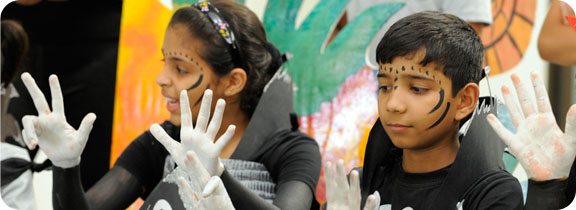
What Makes Us Unique
The Aga Khan Academies are an integrated network of about 18 residential schools in 14 countries in Africa, South and Central Asia, and the Middle East. They are dedicated to expanding access to the highest standard of education for exceptional young men and women, regardless of their ability to pay.
The Academies are more than just residential schools that strive to give their students a sound academic foundation. Each school emphasises the importance of academic excellence while instilling in students a sense of civic responsibility, leadership skills, and the desire, ability, and commitment to give back to their communities locally and globally.
The Academies are grounded in an educational approach that measures success not just by academic achievement, but by how students apply what they know to make the world a better place.
Students receive a grounding in ethics and also develop openness towards difference and acceptance of pluralism by living in diverse communities. As the network of Academies develops, both students and teachers will participate in visits and exchanges to Academies in other countries and regions.
Aims of the Academies programme
Our programme aims to:
- build inquiring, tolerant and creative minds
- empower gifted individuals, including girls, to innovate and lead
- over time, educate a cohort of well-trained local leaders with a sound ethical outlook and great intellectual capacity
- establish a global learning community across diverse geographic, social, economic, religious and tribal boundaries by providing needs-blind and merit-based admissions
- develop highly trained and effective educators
- positively influence education broadly across the targeted regions of the world, with measurable impact.
“The Aga Khan Academies aim to create ethical leaders with a strong sense of civic responsibility who will go on to the best universities in the world, pursue careers of their choice and…become leaders in the governments and the institutions of civil society in their own countries, in international organisations and in all those institutions, academic, economic and artistic that create positive change in our world.”
Embedded in our programme, the Aga Khan Curricular Strands (AK Strands) aim to strengthen understandings and outlooks needed by leaders of the future.
They encompass five critical areas of study:
- Ethics
- Pluralism
- Cultures (with an emphasis on Muslim civilisations)
- Governance and Civil Society
- Economics for Development.
The AK Strands examine issues of global importance and are also tailored to the cultural context of each Academy. This allows students to engage with international issues and challenges while remaining strongly grounded in their local context.
